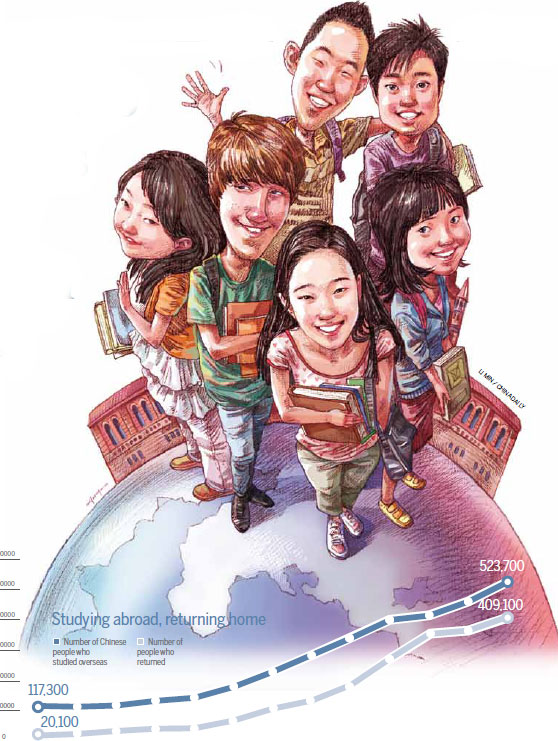From Japan to the overseas hopes of a rising son
In just 30 years studying abroad has become commonplace for Chinese
Yuan Pucheng was one of the very lucky ones. At the age of 27 the nurse was among just a handful her hospital chose to send to study in Japan - at the Chinese government's expense.
It was the early 1990s and Yuan was just one of hundreds of other medical personnel keen to realize a dream of broadening their professional experience in another country.
"At the time, even getting a recommendation to study overseas was difficult," says Yuan, who studied at a college that is part of Tokyo Medical University during 1992 and 1993.
"Almost all the people I know who studied overseas were recommended by some organization or other and studied at the government's expense. I was one of the lucky ones because I could speak a bit of Japanese. You had to do some very stringent training and pass a really tough test before you were given the nod."
Of the few Chinese who studied overseas in the 1980s and the early 1990s, almost all did so thanks to financial support from the government. That is hard to credit these days when you consider the international educational opportunities now available to Chinese. One of the beneficiaries of the great changes is Yuan's son, Sun Yuan.
After graduating from high school and scoring well in an English competence test, Sun enrolled at Monash University in Melbourne, Australia, in 2013. However, unlike his mother two decades earlier who had to rely on government funding, his family paid his way.
"I scored 7 in IELTS (the International English Language Testing System exam) and then started to prepare application material, including a score sheet of my senior high school. I had the necessary qualifications, so it was relatively easy to get offers from Australian universities," says Sun, 23, who opted for Monash over Sydney University and Queensland University and is now in his last year of a bachelor's degree in journalism.
Yuan marvels at how easy it was for her son to pursue his overseas ambitions compared with those of her generation.
"We are much better off financially than we were in those days, and when he attended middle school his English was good, so studying overseas was something he could do rather than going to a Chinese university.
"An agency helped him get the visa too. Young people these days definitely have more choices than we did."
Behind this greater freedom lie policy changes that have made China the largest source country for overseas students.
As the country started to open up and implement economic and social reform in 1978, it began to make it easier for more students to go overseas, where they could study in fields in which the country needed to catch up.
In August 1978 the Ministry of Education called for more undergraduate and graduate students to study overseas, a milestone that is regarded as the genesis of sending students to study overseas at the government's expense.
However, in reality traveling overseas at one's own expense was beyond most people's means.
"The other thing is that if you wanted to study abroad you needed a visa, and they were difficult to get," says Yuan, who retired from a hospital in Shanghai last year.
"Living standards in China were low and developed countries were wary about granting its citizens visas, thinking there was no way they could support themselves and pay their education fees."
Chen Zhiwen, editor-in-chief of a website that publishes information about education, recalls how difficult it was to study abroad in the 1980s.
"At the time, there were so many barriers to doing so that hardly anyone really thought seriously about doing it. It was nothing but a pipe dream."
Being able to get a visa essentially came down to having government financial backing, Chen says.
"Anyone else was almost sure to have their visa application rejected."
In the mid-1990s the policy of supporting students going overseas to study was further relaxed. Those willing to pay their own way would no longer be required to pay a fee to the government, and in the late 1990s agencies that helped with applications to study at overseas tertiary institutions were set up, and the number of those making applications began to surge.
"In the 1980s going abroad to study was seen as a bit of a craze, but these days it has become just a normal thing to do," Chen says.
Now China has become the biggest source country for university students for more than 10 countries, including Australia, Britain, Canada, Japan and the US. The 2015 Open Doors Report by the Institute of International Education says China became the top country of origin for students going to the US in the 2009-10 academic year. It has retained top place six years in a row, after eight years of double-digit increases.
Even as the number of Chinese going overseas has risen, their ages have fallen.
The Open Doors Report said that in the 2009-10 academic year, 127,628 Chinese students studied in the US, 31 percent of them undergraduates. Five years later that figure has shot up to 41 percent.
Among the Chinese undergraduates in the US is Zhou Yutong, 20, who studies at George Washington University in Washington. After graduating from a high school in Beijing, Zhou went to the US to pursue a bachelor of arts degree in communication and French literature in 2014.
"I thought going abroad would be good for a change," Zhou says.
Zhao Xinying contributed to this story.


(China Daily 05/30/2016 page16)














